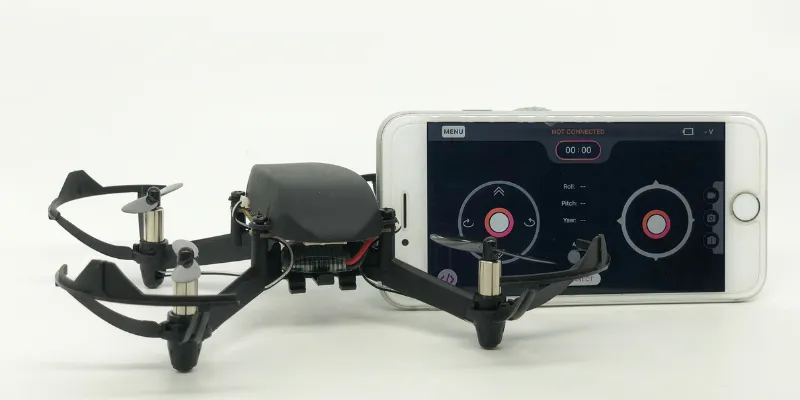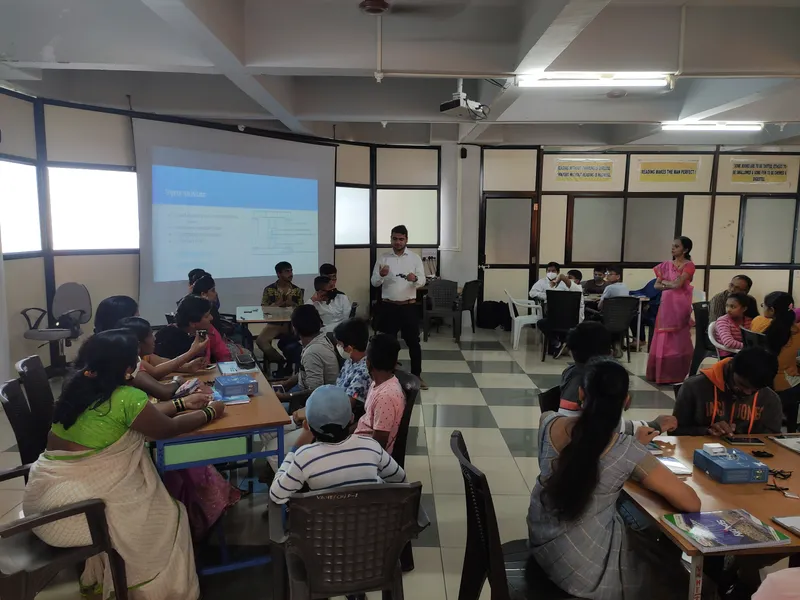Drona Aviation's homegrown nano drones are helping school and college students learn
Drona Aviation manufactures nano drones, targeting students from schools and colleges to teach, learn, and experiment with the devices. It is also one of the first companies in India to make flight controllers for drones.
Key Takeaways
- The overall nano drone market is expected to rise to $4.81 billion by 2027, with the market for drones in education itself going to be $500 million by 2026.
- Drona Aviation not only makes nano drones but also imparts education to students in schools and colleges on how to make drones through its starter kits.
- It has reached 8,000 schools in India and now aims to reach 1 lakh schools and 600 colleges in India in the next 2-3 years.
Ever since India eased regulations with Drone Rules, 2021, the sector has become a hotbed of activity, with drone manufacturing particularly attracting immense interest. The growth of the drone-making market, according to the EY-FICCI report of 2022, has been projected to be worth Rs 1.8 lakh crore by 2030.
While drone operations are used in sectors like agriculture, deliveries, surveillance etc, the market for nano drones is yet to take off in India.
Nano drones are small-sized drones weighing up to 250 grams and are generally used in military operations, tracking and control systems, cinematography, etc. The Ministry of Defence is already looking to buy nano drones for the Indian Army to carry out surveillance in special operations.
While there are only a handful of drone manufacturers in India with companies like ideaForge, Asteria Aerospace, IoTech Avigation etc, leading the space, stands out as it not only makes nano drones in-house but also imparts education to students in schools and colleges on how to make drones through its starter kits. In fact, it is the only company that designs and manufactures its own flight controllers.

Pluto 1.2 with controller
The making of nano drones
IIT Bombay alum Dinesh Sain, who was passionate about drones in college and wanted to pursue a career in the same, found no relevant aerospace job opportunities during his campus placement. “Though AirBus came, there were no relevant roles,” he recalls in a conversation with YourStory.
He saw that the lightweight drone market offered the most potential. The overall nano drone market is expected to rise to $4.81 billion by 2027 and, according to Technavio research, the market for drones in education is itself going to be $500 million by 2026.
In 2014, he started Drona Aviation along with his college alumni Prasanna Shevare and Apurva Godbole, with an accumulated bootstrapped capital of Rs 65 lakh. The company was also incubated at IIT Bombay in 2015 through an investment of Rs 10 lakh.
He also realised that one of the reasons behind the dearth of job opportunities in the sector was not many students knew how to make drones from scratch and companies weren’t taking the initiative to impart the education. The co-founders decided to introduce drones to young minds and train them in building them indigenously.
The Mumbai-based company launched its flagship product Pluto X—a Ready-to-Fly (RTF) nano-drone which can be used by students for tinkering and learning. They can also learn how to add different accessories such as sensors, LEDs, servos etc using UniBus—which is a connector to add accessories. It also allows image processing using the Robot Operating System (ROS) package.
“Pluto was launched after two years of research in 2016, and today, 23 IITs and students from 200+ colleges have already used Pluto for their experiments,” says the Co-founder and COO of Drone Aviation.
Inside the drone zone: How drone startups are meeting the demand for talent
“There are around 30 variations to Pluto that students use today,” he adds, explaining that there is another advanced version of the drone, Pluto 1.2, which is a one-of-a-kind DIY kit to build the drone before flying used to train students.
Other than Pluto X and Pluto 1.2, Drona Aviation also makes add-on accessories like Wi-Fi camera, X-ranging, X-breakout, X-hybrid, Rover-x, and BigQuad to enable different functions.
While the nano drone market is at a nascent stage in India, there are drone programmes which are under development.
“We design and manufacture our own drones, which is very rare in India. With Pluto, we are providing a whole ecosystem to learn, teach and experiment on drones, so it is really difficult for anybody to enter our market,” Sain affirms.
“There are no players in India who make flight controllers. We are importing ICs from China and other raw materials to manufacture the same,” he adds. Presently, Drona Aviation’s flight controllers are available only for students.
In 2019, Drona Aviation collaborated with NITI Aayog's AIM (Atal Innovation Mission) arm to build a drone module. The company also conducted the ‘Train the trainer’ programme for the teachers of schools selected by AIM in multiple cities under Atal Tinkering Labs programme.
Drona Aviation is expected to close FY 2022-23 with a revenue of Rs 1.85 crore, with the major chunk coming from B2B business and around 15%-20% from ecommerce.

Dinesh training students on making drones
Challenges and the vision
While co-founder Shevare (CTO) and Goldbole (CEO) are working behind the scenes, Sain is taking the lead in all operations. At present, the company has a team size of 12.
While building the nano drones required a lot of hard work, customers often end up comparing Pluto with Chinese toy drones. Sain says creating awareness about the use of drones in education has been the biggest struggle.
“We are offering Pluto at a price point between Rs 7,200 and Rs 14,000, which is cost-effective compared to its global counterparts with similar features of programming and modularity but still people compare the price with available cheap drones,” he adds.
Pluto drones are also available on Amazon, Drona Aviation’s own website, and a few robotics marketplaces. Sain says that this year, the company plans to launch in at least 10 other marketplaces.
He envisions that what Arduino is for electronics and Raspberry Pi for computation, Pluto should be to teach, learn and experiment on drones.
Since its inception, the company has reached 8,000 schools pan India. The company now aims to reach one lakh schools and 600 colleges in India in the next two to three years while also launching Pluto-powered drones (white-labelled) for education in the US, Australia, and Europe. It is already in talks with three partners for the same.
The target is to reach out to at least 50,000 schools outside India in the next three years and also collaborate with some companies to bring out a commercial application of nano drones.
Edited by Kanishk Singh







